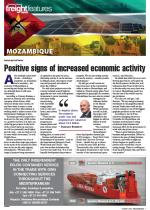Af ter multiple consecutive shocks – including a pandemic, an insurgency and a recession – the economy of Mozambique is recovering and things are looking up, although there is still some uncertainty.According to Duncan Bonnett, a partner at research and consulting company Africa House, while there are always some caveats, ifs and buts when it comes to most African countries, Mozambique is working hard to address some of the fundamental challenges it faces.“Economic growth is expected to be about 5% this year, which points to a positive recovery. If at least one of the big gas projects in the north of the country picks up next year, we will see potentially much higher growth rates – even as much as 10% or more within three years,” he told Freight News.Bonnett said there was a lot of focus on the three major gas projects in the north of the country, but these were by far not the only ongoing developments. “We have seen a range of projects being announced or updated in the past two years, indicating activity is on the increase. In Maputo alone, the projects under way and proposed are valued at about $3.5 billion.”He said other projects across the country included several highway upgrades and new road development; investment in power transition; new dams being erected along with renewable energy plants such as solar and hydro; and railway upgrades. “There are also food resilience programmes, cement plants and post-cyclone water system repair programmes taking place, to name a few.”Bonnett said the return to Mozambique of key donors – such as the International Monetary Fund, World Bank and USAID – this year was another indication that recovery was under way. “It is a very hopeful development that points to progress. We are also seeing activity across the country – another positive development.”He said gas would remain an important part of the conversation when it came to Mozambique, and rightly so. French energy giant Total suspended its gas project in northern Mozambique last year after an armed insurgency by militants linked to the Islamic State group. While operations are still on hold, the project will officially be the biggest in African history if work resumes. “The combined investment in Mozambique’s three big liquefied natural gas (LNG) projects – Total, Eni’s Coral South and Chevron’s Rovuma Basin – should they go to phase 2, would be more than $100bn. Theoretically, this would make it the largest investment in the world, outside of the international space station,” said Bonnett.He added that with Eni set to start f lowing gas from its LNG plant by the fourth quarter of this year, and indications that Total would return to the site early next year, there was no reason Mozambique would not become one of the world’s top-tier gas producers.“It is also not only gas,” said Bonnett. “We are seeing increasing investment in the graphite projects around Pemba that could see the country emerge as one of the biggest graphite producers in the world.”According to Jan de Vries, executive managing director at Cornelder de Moçambique, the business environment is seeing continuous improvement and increased effort by the government to work with the private sector. “There is good dialogue between business and government. Efforts to improve the ease of doing business continue, and while it might not always happen as quickly as the private sector would like, we are seeing change. There is a willing ear from the government side, and that is very positive.”

